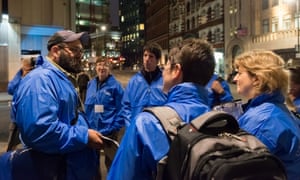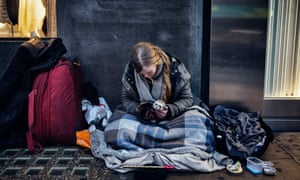Extract from The Guardian
Jess, 36, sits in an alcove of a building near Trafalgar Square
opposite a statue engraved with the word “Fortitude”. She has a backpack
and blankets, her litter neatly packed in a carrier bag. On Sunday, she
says, she is returning to her home in the Midlands because her
daughter, in the guardianship of her parents, is celebrating her seventh
birthday.
Jess has been sleeping rough on the streets “off and on” for five years. “I’ve got Asperger’s,” she says. “My mum and dad wrapped me in cotton wool and I wanted to be myself. You know families.”
What would she like most? “A bed and four walls.” Five years from now, she says smiling, she’d like a home, a daughter and a rich husband. “Write that down!”
Interviewing Jess on Thursday morning is Jen. She is collating information about Jess’s path into homelessness. Jen, normally employed at Channel Four, is a volunteer trained to take part in an extraordinary week-long exercise called Westminster Homeless Action Together, supported by half a dozen homelessness organisations including Groundswell and The Passage. The week is part of a pan-European campaign to end chronic homelessness on the streets by 2020.
Jennifer Travassos commissions £6m worth of services for rough sleepers a year in Westminster, an area that is a particular magnet for those who bed down on the streets, in part because there is safety in numbers.
“I have fewer and fewer resources,” she says. “The initiative is a way of involving the whole community and saying we, as a local authority, don’t have the answers so how can we do this differently?”
“The landscape of rough sleeping is changing,” warns Petra Salva of St Mungo’s, a driving force behind the new initiative. “While services are facing cuts, people are ending up on the streets who may have been able to find a home and a place in previous years.”
In spite of initiatives since the 1990s, chronic homelessness is accelerating. In 2010, on any one night 1,768 people were sleeping rough across England (higher than Scotland and Wales). In 2015, the figure had reached 3,569 – a 102% increase.
On Thursday morning I joined volunteer Jen and Dagnija O’Connell, who works for the London-wide Female Entrenched Rough Sleeper Project. We were one of five teams sent out to churches, day centres and libraries, specifically to find female rough sleepers. The average age of death for a female rough sleeper is 43; men live several years longer. One in three women say that domestic violence contributed to their homelessness. Half of them are mothers.
“Women aren’t counted,” O’Connell says. “In order to be officially verified you have to bed down on the streets at night. Many women are too frightened. They stay on buses or keep walking, so they are rendered invisible. They sleep in the day. It’s a system which is designed to deal with men.”
In the course of the morning, we visit vast and beautiful churches discreetly tucked away in Leicester Square, Covent Garden and Soho. Six out of 10 rough sleepers will spend only one night on the streets. Among the long term, some are destitute refugees and economic migrants. Heather Petch, who organised Westminster Homeless Action Together, says Westminster has a number of Romanians, earning too little as day labourers to send money home and still pay £10 a night for a hostel so that the street becomes their dormitory. Other long-term rough sleepers have complex needs such as mental ill-health – and they are failed.

Jess has been sleeping rough on the streets “off and on” for five years. “I’ve got Asperger’s,” she says. “My mum and dad wrapped me in cotton wool and I wanted to be myself. You know families.”
What would she like most? “A bed and four walls.” Five years from now, she says smiling, she’d like a home, a daughter and a rich husband. “Write that down!”
Interviewing Jess on Thursday morning is Jen. She is collating information about Jess’s path into homelessness. Jen, normally employed at Channel Four, is a volunteer trained to take part in an extraordinary week-long exercise called Westminster Homeless Action Together, supported by half a dozen homelessness organisations including Groundswell and The Passage. The week is part of a pan-European campaign to end chronic homelessness on the streets by 2020.
Jennifer Travassos commissions £6m worth of services for rough sleepers a year in Westminster, an area that is a particular magnet for those who bed down on the streets, in part because there is safety in numbers.
“I have fewer and fewer resources,” she says. “The initiative is a way of involving the whole community and saying we, as a local authority, don’t have the answers so how can we do this differently?”
“The landscape of rough sleeping is changing,” warns Petra Salva of St Mungo’s, a driving force behind the new initiative. “While services are facing cuts, people are ending up on the streets who may have been able to find a home and a place in previous years.”
In spite of initiatives since the 1990s, chronic homelessness is accelerating. In 2010, on any one night 1,768 people were sleeping rough across England (higher than Scotland and Wales). In 2015, the figure had reached 3,569 – a 102% increase.
On Thursday morning I joined volunteer Jen and Dagnija O’Connell, who works for the London-wide Female Entrenched Rough Sleeper Project. We were one of five teams sent out to churches, day centres and libraries, specifically to find female rough sleepers. The average age of death for a female rough sleeper is 43; men live several years longer. One in three women say that domestic violence contributed to their homelessness. Half of them are mothers.
“Women aren’t counted,” O’Connell says. “In order to be officially verified you have to bed down on the streets at night. Many women are too frightened. They stay on buses or keep walking, so they are rendered invisible. They sleep in the day. It’s a system which is designed to deal with men.”
In the course of the morning, we visit vast and beautiful churches discreetly tucked away in Leicester Square, Covent Garden and Soho. Six out of 10 rough sleepers will spend only one night on the streets. Among the long term, some are destitute refugees and economic migrants. Heather Petch, who organised Westminster Homeless Action Together, says Westminster has a number of Romanians, earning too little as day labourers to send money home and still pay £10 a night for a hostel so that the street becomes their dormitory. Other long-term rough sleepers have complex needs such as mental ill-health – and they are failed.

“Currently, we warehouse people at a huge cost, “ Ireland says. “We say, ‘You prove to us first by your behaviour that you deserve housing.’ Then we put people in shelters and hostels that make progress extremely difficult. We set people up to fail.”
Housing First, in contrast, as the name indicates, provides a secure home first and without conditions. Support is offered but the individual has both the choice and control to refuse help: a citizen’s right. And it works. In the US, it is said to have resulted in a $1.3bn saving to the public purse and eight out of 10 remain housed. At the end of August, in Croydon, south London – where serious concerns about growing homelessness have been voiced – volunteers will repeat the survey exercise.
Evolve, an organisation that has already adopted Housing First, is involved. It has a three-year strategy to provide “Y cubes” built off site and installed at a total cost of £60,000 a unit, to offer “move on” housing for the homeless. The modest rents from the cubes could offset further draconian cuts to funding. “The current system is silted up with a real lack of decent affordable accommodation,” says Alice Hainsworth of Evolve. “Housing First can make a genuine difference.”e
On Thursday morning, Jess tells us spiritedly that she can type and photocopy, and is an avid reader, “So, if anyone has a job?” A fellow rough sleeper gives her a battered copy of an Andy McNab novel as we talk. “It’s a good ’un,” he says. Jess says she has met friendship on the street but sometimes people verbally abuse her. “They shout, ‘Wake up!’ at four in the morning. The drunks, pee … if I sense trouble, I move quick.”
Jess has been invited along with 240 rough sleepers interviewed last week to a London event on Tuesday to hear the results of Westminster Homeless Action Together’s survey – and the plans to push harder to bring innovation to a broken system. For now, Jess offers advice.
“When you are on the street everything that makes you a human being can be stripped away,” she says. “If you walk past a homeless person, don’t look at us as if we’re scum. We are people too. We have plans.”

No comments:
Post a Comment